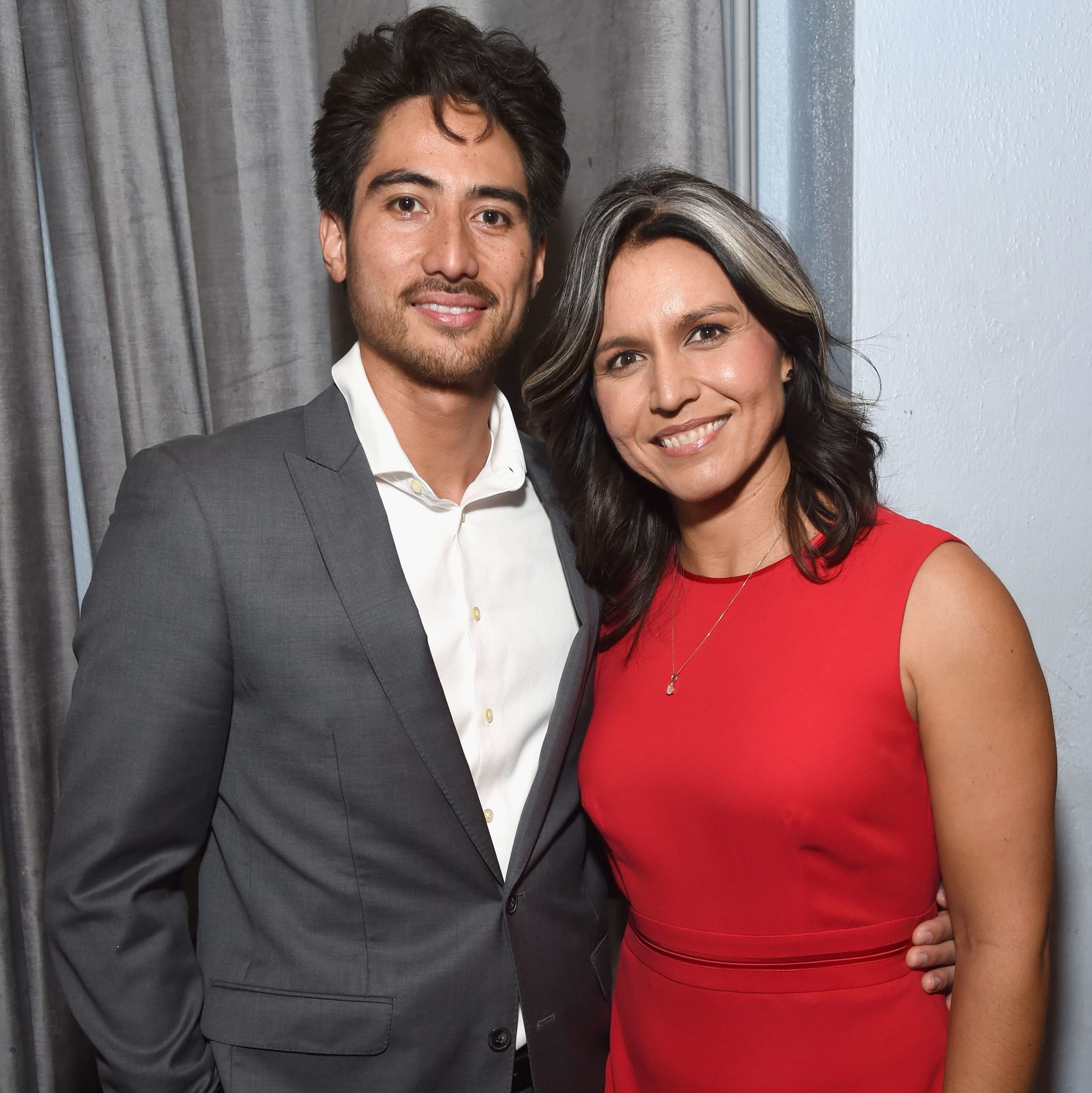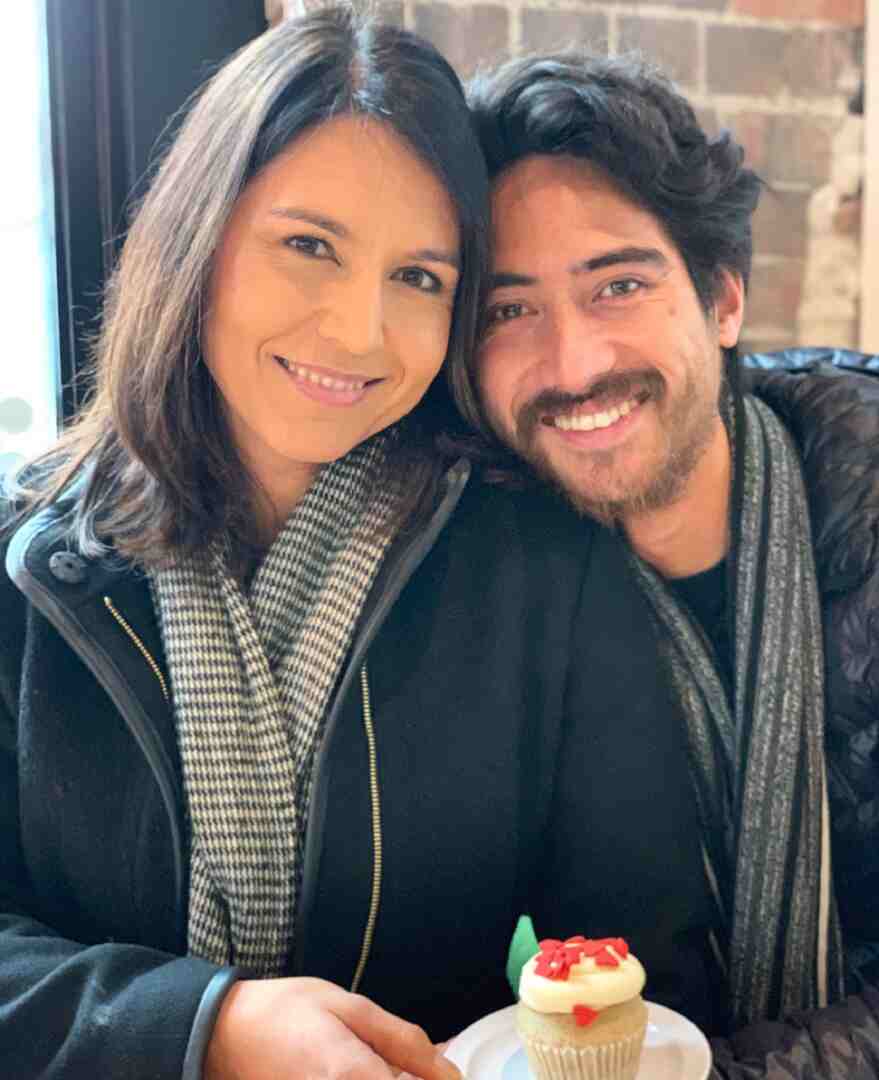Get To Know Tulsi Gabbard's Husband: A Look At His Ethnicity
What is the ethnicity of Tulsi Gabbard's husband?
Tulsi Gabbard's husband, Abraham Williams, is of Samoan descent.
Tulsi Gabbard is an American politician who served as the U.S. Representative for Hawaii's 2nd congressional district from 2013 to 2021. Gabbard is a member of the Democratic Party and was a candidate for the Democratic nomination for President of the United States in 2020. Her husband, Abraham Williams, is a cinematographer and director. He is of Samoan descent and was born in American Samoa.
What is the ethnicity of Tulsi Gabbard's husband?
Tulsi Gabbard, an American politician and former Democratic presidential candidate, is married to Abraham Williams, a cinematographer and director of Samoan descent.
- Samoan heritage: Williams's ethnicity is rooted in the Polynesian islands of Samoa, a unique cultural identity.
- Cultural traditions: As a Samoan, Williams may observe cultural traditions such as fa'a Samoa, which emphasizes family, respect, and communal living.
- Shared values: Gabbard and Williams share the common values of service and social justice, which may have drawn them together.
- Diversity: Their marriage represents the growing diversity in American society and challenges traditional notions of ethnicity.
- Cultural exchange: Their union provides an opportunity for cultural exchange and understanding between different ethnic backgrounds.
- Personal connection: Ultimately, the ethnicity of Tulsi Gabbard's husband is secondary to their personal connection and shared life experiences.
Samoan heritage
The Samoan heritage of Tulsi Gabbard's husband, Abraham Williams, holds cultural significance and nuances that contribute to his unique identity and worldview.
- Cultural traditions and values: Samoan culture places great emphasis on family, respect, and communal living. These values may shape Williams's personal life and interactions, influencing his perspectives and decision-making.
- Connection to land and environment: Samoans have a deep connection to their land and the natural environment. This connection may foster in Williams a sense of stewardship and appreciation for the beauty and fragility of the natural world.
- Artistic expression: Samoan culture is rich in artistic traditions, including dance, music, and storytelling. These art forms may provide Williams with a means of cultural expression and a way to connect with his heritage.
- Samoan diaspora: As part of the Samoan diaspora, Williams may have a transnational identity, connecting him to both Samoa and his adopted country, the United States. This dual perspective may shape his understanding of cultural identity and global citizenship.
In conclusion, the Samoan heritage of Abraham Williams adds a rich cultural dimension to his identity and life experiences, influencing his values, perspectives, and sense of belonging. It contributes to the diversity of American society and offers a unique lens through which to explore the complexities of cultural identity and cross-cultural understanding.
Cultural traditions
Samoan cultural traditions, including fa'a Samoa, play a significant role in shaping the identity and values of Abraham Williams, Tulsi Gabbard's husband. Fa'a Samoa emphasizes the following core principles:
- Family: The family unit is central to Samoan culture, providing a strong foundation for individuals and the community. Fa'a Samoa values respect for elders,, and maintaining strong family ties.
- Respect: Respect is a cornerstone of Samoan culture, extending beyond individuals to include the environment and natural resources. Fa'a Samoa teaches individuals to treat others with dignity and to value their unique contributions.
- Communal living: Samoans place great importance on communal living and cooperation. Fa'a Samoa encourages individuals to work together for the betterment of the community, sharing resources and responsibilities.
These cultural traditions have implications for Williams's role as a husband and public figure:
- Family support: The emphasis on family in fa'a Samoa may provide Williams with a strong support system and a sense of belonging.
- Respectful relationships: The value of respect in fa'a Samoa may guide Williams's interactions with his wife, colleagues, and the public.
- Community engagement: The emphasis on communal living in fa'a Samoa may encourage Williams to actively participate in his community and support social causes.
In conclusion, the cultural traditions that Abraham Williams observes as a Samoan, particularly fa'a Samoa, shape his identity, values, and relationships. These traditions provide him with a strong foundation and a sense of community, influencing his role as a husband and public figure.
Shared values
The shared values of service and social justice form a common ground upon which Tulsi Gabbard and Abraham Williams have built their relationship. Gabbard, a former Democratic presidential candidate and current U.S. Representative for Hawaii, and Williams, a cinematographer and director, are both deeply committed to making a positive impact on the world.
Gabbard's political career has been marked by her advocacy for progressive causes, including healthcare reform, environmental protection, and an end to war. Williams, through his work in film, has explored social issues such as inequality, discrimination, and the human condition. Their shared values have likely played a significant role in their mutual attraction and compatibility.
Beyond their personal relationship, the connection between shared values and ethnicity can be seen in the broader context of social movements and political alliances. Individuals from diverse ethnic backgrounds often come together to work towards common goals that align with their shared values. This can lead to the formation of coalitions and partnerships that transcend ethnic boundaries and promote social change.
In conclusion, the shared values of service and social justice not only serve as a foundation for the relationship between Gabbard and Williams, but also highlight the importance of common values in fostering connections across ethnic and cultural divides. Understanding this connection can contribute to building more inclusive and just societies.
Diversity
The marriage between Tulsi Gabbard, an American politician of Indian and Samoan descent, and Abraham Williams, a cinematographer and director of Samoan descent, exemplifies the growing diversity of American society. Their union challenges traditional notions of ethnicity and highlights the increasing fluidity and complexity of racial and cultural identity in the United States.
Traditionally, ethnicity has been viewed as a fixed and immutable characteristic, but the marriage of Gabbard and Williams demonstrates that ethnicity is not always clear-cut or easily defined. Their relationship transcends traditional ethnic boundaries and represents a new paradigm of American identity that is inclusive and multifaceted.
The growing diversity of American society is a reflection of the changing demographics of the country. Immigration, globalization, and interracial marriage are all contributing to the creation of a more diverse and dynamic population. This diversity is a source of strength for the United States, as it brings together people from all walks of life and enriches the nation's culture and traditions.
The marriage of Gabbard and Williams is a powerful symbol of the changing face of America. It challenges traditional notions of ethnicity and celebrates the growing diversity of the American people. Their union is a reminder that ethnicity is not a barrier to love, understanding, or success.
Cultural exchange
The marriage between Tulsi Gabbard, an American politician of Indian and Samoan descent, and Abraham Williams, a cinematographer and director of Samoan descent, provides a unique opportunity for cultural exchange and understanding between different ethnic backgrounds.
- Sharing traditions and customs: Their union allows them to share their respective cultural traditions and customs, fostering a deeper appreciation and understanding of each other's heritage.
- Breaking down stereotypes: Their relationship challenges stereotypes and promotes a more nuanced understanding of different cultures, highlighting the diversity within ethnic groups.
- Promoting inclusivity: By embracing their different cultural backgrounds, Gabbard and Williams promote inclusivity and demonstrate the value of diversity in society.
- Inspiring others: Their marriage serves as an inspiration for others to embrace cultural differences and build bridges between communities.
In conclusion, the cultural exchange facilitated by Gabbard and Williams' union enriches their personal lives, challenges societal norms, and contributes to a more inclusive and understanding society. It highlights the power of interethnic relationships to foster cultural exchange and promote harmony.
Personal connection
While ethnicity provides a cultural context for individuals, personal connections and shared experiences often transcend ethnic boundaries. In the case of Tulsi Gabbard and Abraham Williams, their personal connection and shared life experiences have taken precedence over their respective ethnicities.
- Shared values and beliefs: Gabbard and Williams share common values and beliefs, including a commitment to public service and social justice. These shared values have formed the foundation of their relationship and have guided their life choices.
- Life experiences: Gabbard and Williams have faced similar life experiences, including serving in the military and pursuing careers in public service. These shared experiences have created a deep bond between them and have contributed to their mutual understanding and support.
- Mutual respect and admiration: Gabbard and Williams have a deep respect and admiration for each other's accomplishments and personal qualities. This mutual respect has fostered a strong and lasting relationship between them.
- Love and companionship: At the heart of Gabbard and Williams' relationship is love and companionship. They enjoy spending time together, sharing their thoughts and feelings, and supporting each other through life's challenges.
In conclusion, the personal connection and shared life experiences of Tulsi Gabbard and Abraham Williams have played a more significant role in their relationship than their respective ethnicities. Their story highlights the power of human connection and the ability to forge meaningful relationships across ethnic and cultural boundaries.
FAQs on Tulsi Gabbard's Husband's Ethnicity
This section addresses frequently asked questions about the ethnicity of Tulsi Gabbard's husband, providing clear and informative answers.
Question 1: What is the ethnicity of Tulsi Gabbard's husband?
Abraham Williams, Tulsi Gabbard's husband, is of Samoan descent. He was born in American Samoa, a U.S. territory in the South Pacific, and his ethnicity is rooted in the Polynesian islands of Samoa.
Question 2: How does Abraham Williams's Samoan heritage influence his life and relationship with Gabbard?
Williams's Samoan heritage shapes his cultural identity, values, and worldview. It emphasizes family, respect, and communal living, which may influence his interactions with Gabbard and their family life. Additionally, his connection to the land and environment, as well as the artistic traditions of Samoa, may contribute to his personal and creative expression.
Summary: Tulsi Gabbard's husband, Abraham Williams, is of Samoan descent, and his ethnicity plays a role in shaping his cultural identity and values. Their marriage represents the growing diversity in American society and challenges traditional notions of ethnicity, highlighting the importance of shared values and personal connections in building meaningful relationships across cultural boundaries.
Conclusion
The exploration of the ethnicity of Tulsi Gabbard's husband, Abraham Williams, reveals the multifaceted nature of cultural identity and the growing diversity in American society. Williams's Samoan heritage shapes his values, worldview, and relationship with Gabbard, challenging traditional notions of ethnicity and highlighting the importance of shared values and personal connections in building meaningful relationships across cultural boundaries.
Furthermore, their marriage serves as a reminder of the evolving demographics of the United States, where individuals from diverse ethnic backgrounds are increasingly coming together to form families and communities. This trend towards a more inclusive and diverse society is a source of strength for the nation, as it brings together people from all walks of life and enriches the nation's culture and traditions.
In conclusion, the ethnicity of Tulsi Gabbard's husband is not simply a matter of cultural heritage, but also a reflection of the changing face of America and the growing importance of shared values and personal connections in forging meaningful relationships across ethnic and cultural divides.

Who Is Abraham Williams, Tulsi Gabbard's Husband? Starsgab

Tulsi Gabbard Husband, Wiki, Age, Latest News, Parents, Net Worth

Tulsi Gabbard Husband, Wiki, Age, Latest News, Parents, Net Worth